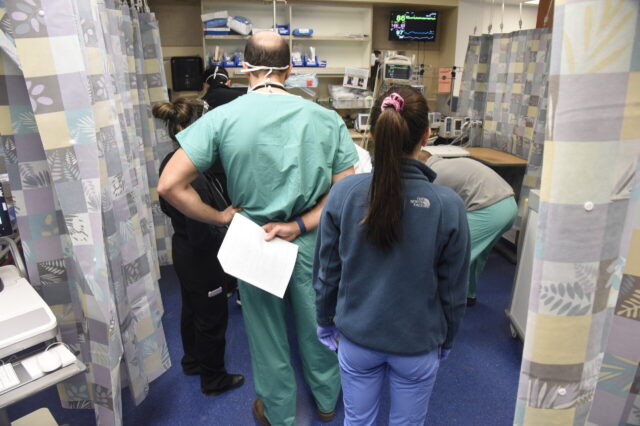UF researchers receive $1.46 million grant to implement alternatives to opioids program

Imagine a world where emergency room patients and providers have access to a menu of pain management treatment options that include a blend of traditional and integrative techniques.
This is the vision held by a team at the University of Florida College of Medicine – Jacksonville looking to create a new way of caring for patients with a variety of pain conditions. With funding received by the Substance Abuse and Mental Health Services Administration, or SAMHSA, this concept will soon become a reality at the UF Health Jacksonville and UF Health North emergency rooms.
From 1999 to 2018, more than 232,000 people died in the United States from overdoses involving prescription opioids, according to the Centers for Disease Control and Prevention. This troubling statistic has been a key issue for the U.S. Department of Health and Human Services and its agencies like SAMHSA since the opioid epidemic was declared a public health emergency in the U.S. in 2017. In addition, since the start of the COVID-19 pandemic, opioid use-related overdoses have dramatically increased.
“I am proud of our emergency medicine research team for being awarded this SAMHSA grant to institute such an important program at UF Health Jacksonville,” said Steven Godwin, M.D., FACEP, a professor of emergency medicine and chair of the department of emergency medicine. “This accomplishment speaks volumes about the dedication our physicians have for providing high-quality care and developing innovative pain practices to benefit our patients.”
The team was awarded $1.46 million as part of a three-year grant to implement the project. The funds are part of the SAMHSA Emergency Department Alternatives to Opioids Demonstration Program. The purpose of the program is to develop and implement alternatives to opioids for pain management in emergency room settings.
The targeted pain conditions include musculoskeletal and back pain, renal colic and headaches. From aromatherapy inhalers for home use to virtual reality and non-opioid analgesics such as lidocaine patches and menthol gel, along with procedures like trigger point injections, the team wants to augment current pain management practices. New order panels will improve providers’ access to a menu of pain management options that can be tailored based on patient medical history, acuity and preferences. This new program will also assist in developing a pain coaching and education model service and patient discharge toolkits to promote the use of alternatives to opioids.
The Pain Assessment and Management Initiative’s Emergency Department Alternatives to Opioids program, or PAMI ED-ALT, is the newest addition to the PAMI program founded in 2014 by Phyllis Hendry, M.D., a professor and associate chair for research in the department of emergency medicine. PAMI’s overall goal is advancing innovation and safety in pain education, patient care and research. Sophia Sheikh, M.D., an assistant professor of emergency medicine, medical toxicologist and medical director of the Florida/USVI Poison Information Center – Jacksonville, is the principal investigator for the PAMI ED-ALT program.
“The PAMI ED-ALT team has a great opportunity to change how pain management is conducted in the emergency care setting by creating an easy access order panel menu within the electronic health record combining pharmacologic and non-pharmacologic options in one place,” Sheikh said. “We are encouraged by the many physicians, nurses and pharmacists who have already expressed support and interest in this new approach to treating painful conditions. It is going to be a collective and multidisciplinary effort to move in this new direction.”
The project submission was a joint effort with the UF Center for Data Solutions, led by Jennifer Fishe, M.D., an assistant professor of emergency medicine and CDS director, along with Jennifer Brailsford, Ph.D., an epidemiology analyst, and Rebecca Liao, a data analyst. Co-investigator Kendall Webb, M.D., chief medical information officer, and her team will assist with the development and implementation of the order panels. Ashley Norse, M.D., associate chair of emergency department operations, will assist with implementation feedback, education and promotion of project adoption by staff and physicians.
The department of emergency medicine has hired Magda Schmitzberger, M.P.H., C.P.H., formerly with the North Florida/South Georgia Veterans Health System, to serve as the project director to oversee implementation. Her previous work includes research and QI/clinical demonstration projects on stroke caregiving and suicide prevention. Haytham Helmi, M.D., assistant director of emergency medicine research, has served as the project director since PAMI ED-ALT began on Aug. 31 and will continue to assist with program efforts.
Hendry has long held a vision of integrating more nonpharmacologic and non-opioid pain management options within the emergency department infrastructure to lead to improved patient outcomes and satisfaction.
“Our goal is to help patients better deal with their pain while giving health care providers new tools and techniques to manage pain without the need for long-term medications. Our team worked day and night to get this proposal submitted and it is very rewarding to see our vision becoming a reality,” Hendry said. “We believe this can be a model for care in other emergency departments across the country and our team is proud to be one of only 10 programs funded in the U.S. under this SAMHSA funding announcement.”